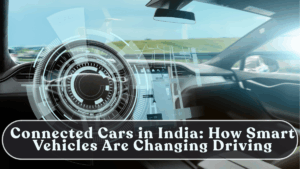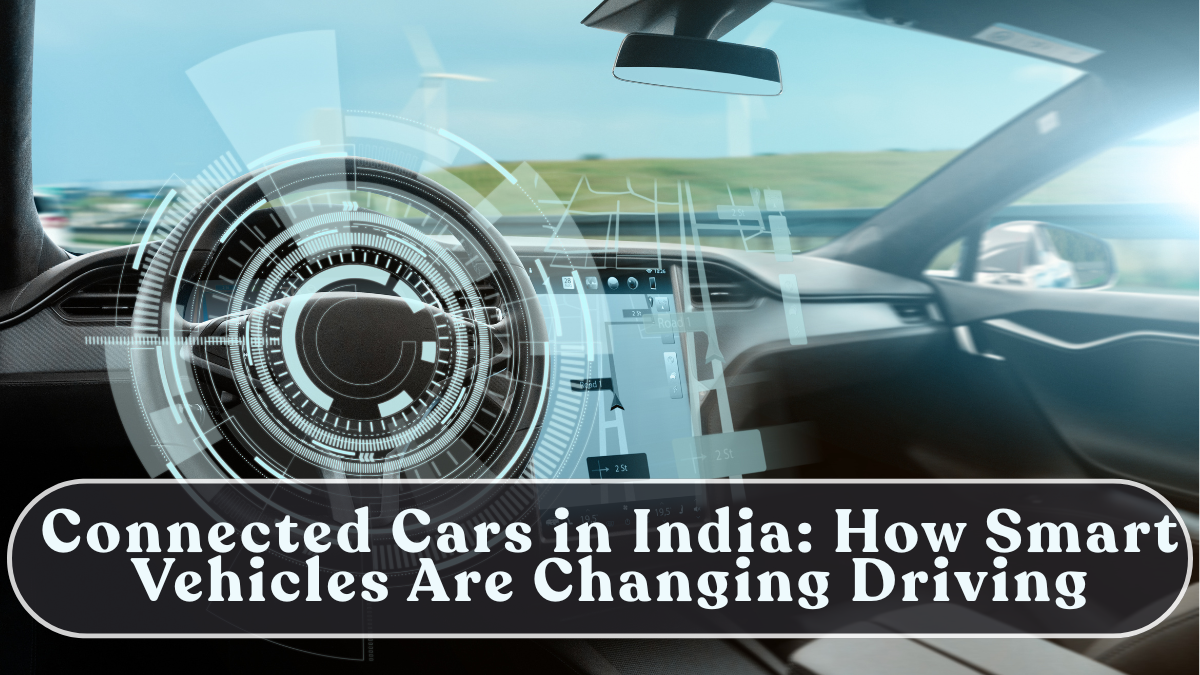The future of automobiles is digital, and connected cars in India are leading that evolution. As vehicles turn into smart, data-driven machines, Indian drivers are now experiencing an entirely new level of safety, comfort, and connectivity. With 4G and 5G networks expanding across the country, automakers are integrating IoT (Internet of Things) features that keep drivers informed, vehicles secure, and rides smoother than ever before.

What Are Connected Cars and Why Are They Important?
Connected cars use onboard sensors, cloud computing, and internet connectivity to exchange real-time data between the vehicle, manufacturer, and driver. This enables features such as live navigation, emergency assistance, remote diagnostics, and vehicle tracking. In India, connected technologies have become a key differentiator among premium and mid-range car buyers, driving rapid market growth.
-
Real-time traffic updates reduce commute time.
-
Predictive maintenance alerts prevent unexpected breakdowns.
-
Remote locking and tracking enhance vehicle security.
-
Cloud-based software updates keep features current without service visits.
According to a 2025 report by the India Automotive Research Council, over 35% of new cars sold in India are now “connected” vehicles — a number expected to double by 2027.
Leading Automakers Driving Connectivity in India
Global and Indian manufacturers are in a race to integrate connected features into every new launch.
| Brand | System Name | Key Features | Notable Models |
|---|---|---|---|
| Hyundai | BlueLink | SOS assist, remote start, geo-fencing | Creta, Venue |
| Tata Motors | iRA | Voice commands, car health reports | Nexon EV, Harrier |
| Mahindra | Adrenox | Alexa integration, smartwatch control | XUV700, Scorpio-N |
| MG Motor | i-Smart | Over-the-air updates, AI voice assistant | Hector, Astor |
| Kia | UVO Connect | Remote AC control, live diagnostics | Seltos, Sonet |
These systems allow users to control their cars using mobile apps, enhancing convenience and improving driver engagement.
Technology Behind India’s Smart Cars
The growth of IoT cars in India has been supported by advancements in telecom and AI-based analytics.
-
5G connectivity allows faster data transfer and lower latency.
-
Cloud computing supports real-time analysis for predictive maintenance.
-
AI-based voice assistants enable hands-free control for infotainment and navigation.
-
V2X (Vehicle-to-Everything) communication is under testing for autonomous driving readiness.
As automakers collaborate with tech companies like Google, Amazon, and Qualcomm, the integration between vehicles and smartphones is becoming seamless.
Benefits for Drivers and Manufacturers
Connected cars are transforming both user experience and the auto industry’s service model.
For drivers:
-
Real-time alerts for traffic, weather, and road safety.
-
Access to remote services through mobile apps.
-
Personalized recommendations based on driving habits.
For manufacturers:
-
Access to vehicle data helps improve design and quality.
-
Predictive analytics enable faster maintenance scheduling.
-
Customer engagement extends beyond purchase, building brand loyalty.
This data-driven ecosystem is setting the foundation for India’s transition toward autonomous and self-driving cars.
Challenges in India’s Connected Car Revolution
While the potential is immense, challenges persist.
-
Data privacy concerns: Drivers worry about data misuse and security breaches.
-
Network reliability: Poor internet coverage in rural areas limits full feature access.
-
Cost factor: Advanced systems increase vehicle prices by ₹30,000–₹1 lakh.
-
Aftermarket adoption: Retrofitting connectivity to older cars remains complex.
Addressing these hurdles will require clear data protection policies, stronger infrastructure, and cost optimization.
The Road Ahead: A Smarter, Safer Future
India’s connected vehicle market is expected to exceed ₹30,000 crore by 2030, fueled by government initiatives like Bharat New Car Assessment Program (BNCAP) and Digital India. With the rise of EVs and 5G networks, vehicles are evolving into mobility platforms capable of autonomous navigation, self-diagnostics, and AI-assisted driving.
The future will see vehicles communicating not only with humans but also with each other and city infrastructure — making traffic smarter, roads safer, and transportation more efficient.
Conclusion
The rise of connected cars in India is transforming how people drive and interact with their vehicles. What was once a luxury feature is fast becoming a necessity for safety and convenience. As connectivity spreads from metros to smaller cities, the Indian automotive landscape will shift toward a new era of smart mobility, where every journey is intelligent, personalized, and connected.
FAQs
What is a connected car?
A connected car is a vehicle that uses internet and sensor technology to communicate with other devices and provide real-time data to the driver.
Which are the top connected car systems in India?
Popular systems include Hyundai BlueLink, Tata iRA, MG i-Smart, Kia UVO Connect, and Mahindra Adrenox.
Are connected car features available in affordable models?
Yes, several mid-range models like Hyundai Venue and Tata Nexon EV offer connected car technology.
What are the major benefits of connected cars?
They offer remote control, vehicle tracking, predictive maintenance, and enhanced safety.
Is India ready for autonomous vehicles?
Not yet fully, but the growing connected car ecosystem and 5G rollout are crucial steps toward that future.
